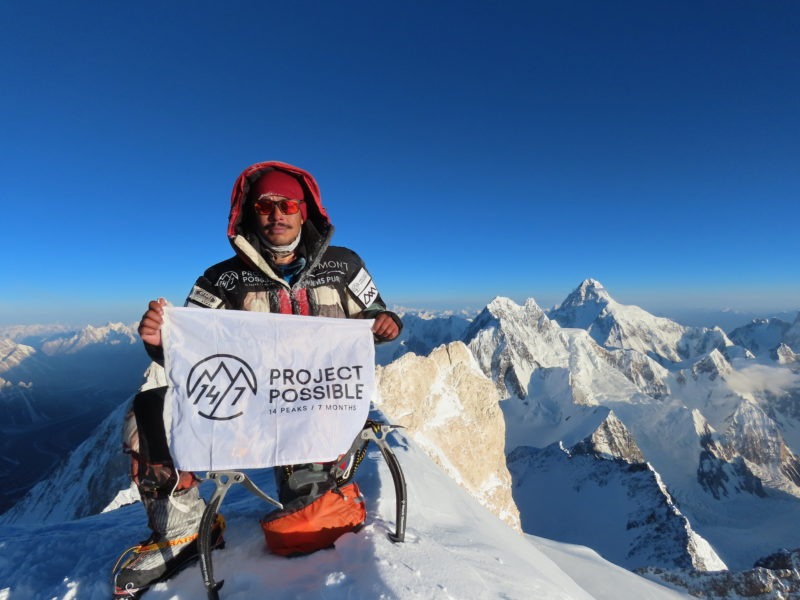Nepali climber claims new record for 14 highest peaks
A picture released by Nirmal “Nims” Purja’s Bremont Project Possible shows the climber on the summit of Gasherbrum II (Handout)
Kathmandu (AFP) – A Nepali mountaineer on Tuesday smashed the speed record for summiting the world’s 14 highest peaks, racing up all “8000ers” in just six months and six days, organisers said.
The previous record for the 14 mountains above 8,000 metres (around 26,250 feet) — completed by Nirmal Purja at 8.59 am (1259 GMT) on Tuesday — was almost eight years.
“MISSION ACHIEVED! says @nimsdai from the summit of #Shishapangma,” read a post on Purja’s Facebook page, while a statement quoted the former British elite soldier as being “overwhelmed and incredibly proud” after his 189-day feat.
“It has been a gruelling but humbling six months, and I hope to have proven that anything is possible with some determination, self-belief and positivity,” the 36-year-old said.
“We started with nothing, but look how far we’ve come.”
Starting with Italy’s legendary Reinhold Messner in 1986 — who on Tuesday praised Purja’s “unique mountaineering accomplishment” — around 40 climbers have climbed the Earth’s 14 highest mountains, but none have come close to Purja’s speed.
The late Polish climber Jerzy Kukuczka took seven years, 11 months and 14 days in 1987. South Korean Kim Chang-ho completed the challenge one month faster — although unlike Kukuczka and also Purja, he never used supplementary oxygen.
– ‘Project possible’ –
Purja, a former member of the Gurkhas — a brigade of Nepalis in British army famous for their fearlessness — as well as the elite Special Boat Service, kicked off “Project Possible” in April.
In the first part of his record attempt, Purja ticked off Annapurna, Dhaulagiri, Kanchenjunga, Everest, Lhotse and Makalu in just one month.
He was not alone on Everest, reaching the summit on May 22 with 320 others and snapping a photo of a traffic jam of climbers on the world’s highest mountain that went viral.
This season a record 885 people climbed the famous mountain. A total of 11 people died, with at least four of those deaths blamed on overcrowding.
A month later, Purja headed to Pakistan for the second part, where he first tackled the notorious Nanga Parbat at 8,125 metres.
Battling sleep deprivation to meet his target, Purja said he was almost sprinting up and down five of Pakistan’s highest peaks including Gasherbrum I, Gasherbrum II and K2, the second highest in the world.
Twenty-three days later he was standing atop Broad Peak, his fifth and final mountain of the second phase.
Purja began his final push in September, reaching the tops of Cho Oyu and Manaslu within a week.
Tuesday’s summit of Shishapangma was the final hurdle.
When he first told others about his new quest, “everyone was laughing at me,” Purja told AFP in a recent interview in Kathmandu as he awaited permission from the Chinese government to tackle Shishapangma.
He said then he wanted his feats to inspire the next generation of Nepali climbers to break his records.
Sherpas — Nepalis who often work as guides for foreign mountaineers — are the backbone of the lucrative climbing industry, but don’t attract anywhere near the same amount of attention or accolades as their international companions.
“International attention and sponsors rush easily towards foreign climbers but Nepalis don’t get such opportunities,” he said.
Purja’s record was yet to be verified independently, although he has individual summit certificates from Nepal and Pakistan and will apply to Guinness World Records for recognition, his expedition organisers said.
He also said he broke seven other records, including the fastest summit of the world’s three highest mountains and climbing Everest, Lhotse and Makalu in 48 hours.
Disclaimer: Validity of the above story is for 7 Days from original date of publishing. Source: AFP.


